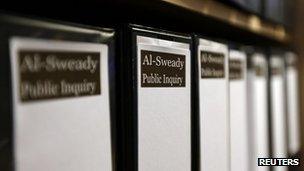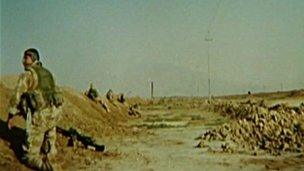Al-Sweady inquiry shown Iraq 'torture' photographs
- Published

Staff to the inquiry have trawled through as many as 12,000 documents
A public inquiry into allegations that British soldiers mistreated and murdered Iraqi detainees in 2004 has been shown graphic photographs of alleged victims of torture.
The Al-Sweady inquiry will examine claims following the Battle of Danny Boy in Maysan province, southern Iraq.
Jonathan Acton Davis QC said the inquiry aimed to identify the events surrounding the deaths of 28 Iraqi men.
The Ministry of Defence has said it has seen no evidence to support the claims.
Signs of torture
The inquiry, which opened on Monday, will look at allegations that Iraqis were unlawfully killed at Camp Abu Naji on 14 and 15 May and 2004.
It will also consider claims that five Iraqi detainees were tortured and ill-treated at Camp Abu Naji (CAN), and at a detention facility at Shaibah Logistics Base between 14 May and 23 September 2004.
In an opening statement, Mr Acton Davis, counsel to the inquiry, said death certificates for three of the men showed signs of torture.
Mr Acton Davis said the inquiry was ordered after Hussein Fadel Abass, Atiyah Sayid Abdelreza, Hussein Jabbari Ali, Mahdi Jassim Abdullah and Ahmad Jabbar Ahmood claimed violations of their human rights at the High Court.
He said: "The claim related to events which began on 14 May 2004, when Iraqi insurgents ambushed vehicles belonging to the Argyll and Sutherland Highlanders near to a permanent vehicle checkpoint known as Danny Boy which was some 5km north-east of Majar al-Kabir on Route Six in Iraq," he said.
'Stark dispute'
"A fierce battle ensued which involved not only the Argylls but also soldiers from the Princess of Wales Royal Regiment.
"It resulted in many Iraqis being killed and in two British soldiers being wounded."

The claims followed a major gun battle near Majar al-Kabir in southern Iraq
He said enemy dead would normally have been left on the battlefield, but British soldiers were apparently given an order to identify the dead to try to find a man thought to be involved in the murder of six British soldiers in 2003.
The bodies of 20 Iraqis were taken back to CAN and nine others were detained, he said.
"It was the claimants' case that not all of the 20 died on the battlefield and that at least one of them was murdered by a British soldier after he had been returned alive to CAN," Mr Acton Davis said.
He said there was a "stark dispute" between Iraqi and military evidence.
Mr Acton Davis said, after examining death certificates, the inquiry would look to establish the circumstances and cause of death of 28 people.
He said it was accepted by both sides that bodies were handed over on 15 May 2004 but the number and their injuries were not agreed.
Mr Acton Davis said full post-mortem examinations had not been carried out at Al Sadr Hospital because a gunfight broke out outside the hospital.
Document trawl
The inquiry, named after one of the dead men, 19-year old Hamid al-Sweady, is the second public inquiry into allegations of abuse by British troops in Iraq, following one that examined the death in 2003 of Baha Mousa.
Three years have passed between the setting up of this inquiry and its opening as staff, including retired detectives, have trawled through as many as 12,000 documents.
It has already cost £15m, and that figure is expected to double, with as many as 200 military witnesses likely to be called and 45 Iraqis expected to give evidence by video-link from Beirut, including medical staff and ambulance drivers.
Fifteen Iraqi witnesses are due to give evidence in person, among them the nine detainees and family members of the dead.
The inquiry is being chaired by retired High Court judge Sir Thayne Forbes and is set to last a year.
The inquiry, at Finlaison House in central London, will continue on Tuesday at 10:30 GMT.
- Published4 March 2013